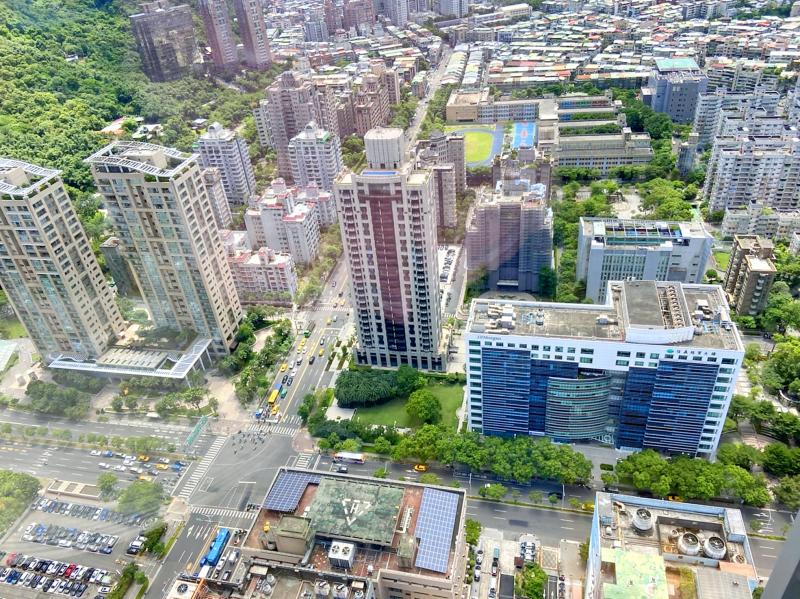The presale and new housing market last quarter held steady from three months earlier by measure of projects for sale, showing a fractional 0.9 percent growth to NT$328 billion (US$11.13 billion), a Cathay Real Estate Development Co (國泰建設) survey showed on Wednesday.
Sales rates slowed somewhat, but selling prices rose nationwide as developers and builders passed rising construction costs on to buyers.
This segment of the property market continued to perform well, judging by housing prices, the survey showed.

Photo: Hsu Yi-ping, Taipei Times
Developers and builders launched 231 projects offering 20,559 units that could generate NT$328 billion in sales, representing a 13.5 percent increase compared with a year earlier, it said.
The increase in revenue came even though the number of projects and units declined 6.1 percent and 2 percent from their respective levels three months earlier, it said.
That meant the supply side refrained from active project launches, but raised prices to reflect spikes in labor and building material costs, it said.
Some developers pushed back their release schedules after government agencies introduced a spate of unfavorable measures to cool the market, it said.
The Ministry of the Interior is sponsoring a bill to impose stiff fines on dishonest marketing practices, and the central bank is suggesting further credit controls after hiking interest rates by 0.25 percentage points in March.
Potential transaction prices gained 13.66 percent to NT$432,500 per ping (3.3m2) nationwide, while leeway for price concessions was virtually flat at 7.71 percent, it said.
The 30-day sales rate was relatively stable at 15.2 percent, down 1.86 percentage points from the previously quarter, it said.
Price increases are most evident in Hsinchu County at 19.2 percent, followed by Taoyuan at 18.45 percent, and Kaohsiung at 16.37 percent, it said.
Prices for presale housing projects in Taichung and Tainan both rose 11 percent, while advancing 8.6 percent in Taipei and 8.52 percent in New Taipei City.
Average selling prices in Taipei reached NT$1.06 million per ping, a mark previously limited to popular locations, it said, adding that uncertainty is gathering pace this quarter due to heightening economic downside risks.

MULTIFACETED: A task force has analyzed possible scenarios and created responses to assist domestic industries in dealing with US tariffs, the economics minister said The Executive Yuan is tomorrow to announce countermeasures to US President Donald Trump’s planned reciprocal tariffs, although the details of the plan would not be made public until Monday next week, Minister of Economic Affairs J.W. Kuo (郭智輝) said yesterday. The Cabinet established an economic and trade task force in November last year to deal with US trade and tariff related issues, Kuo told reporters outside the legislature in Taipei. The task force has been analyzing and evaluating all kinds of scenarios to identify suitable responses and determine how best to assist domestic industries in managing the effects of Trump’s tariffs, he

TIGHT-LIPPED: UMC said it had no merger plans at the moment, after Nikkei Asia reported that the firm and GlobalFoundries were considering restarting merger talks United Microelectronics Corp (UMC, 聯電), the world’s No. 4 contract chipmaker, yesterday launched a new US$5 billion 12-inch chip factory in Singapore as part of its latest effort to diversify its manufacturing footprint amid growing geopolitical risks. The new factory, adjacent to UMC’s existing Singapore fab in the Pasir Res Wafer Fab Park, is scheduled to enter volume production next year, utilizing mature 22-nanometer and 28-nanometer process technologies, UMC said in a statement. The company plans to invest US$5 billion during the first phase of the new fab, which would have an installed capacity of 30,000 12-inch wafers per month, it said. The

Taiwan’s official purchasing managers’ index (PMI) last month rose 0.2 percentage points to 54.2, in a second consecutive month of expansion, thanks to front-loading demand intended to avoid potential US tariff hikes, the Chung-Hua Institution for Economic Research (CIER, 中華經濟研究院) said yesterday. While short-term demand appeared robust, uncertainties rose due to US President Donald Trump’s unpredictable trade policy, CIER president Lien Hsien-ming (連賢明) told a news conference in Taipei. Taiwan’s economy this year would be characterized by high-level fluctuations and the volatility would be wilder than most expect, Lien said Demand for electronics, particularly semiconductors, continues to benefit from US technology giants’ effort

‘SWASTICAR’: Tesla CEO Elon Musk’s close association with Donald Trump has prompted opponents to brand him a ‘Nazi’ and resulted in a dramatic drop in sales Demonstrators descended on Tesla Inc dealerships across the US, and in Europe and Canada on Saturday to protest company chief Elon Musk, who has amassed extraordinary power as a top adviser to US President Donald Trump. Waving signs with messages such as “Musk is stealing our money” and “Reclaim our country,” the protests largely took place peacefully following fiery episodes of vandalism on Tesla vehicles, dealerships and other facilities in recent weeks that US officials have denounced as terrorism. Hundreds rallied on Saturday outside the Tesla dealership in Manhattan. Some blasted Musk, the world’s richest man, while others demanded the shuttering of his